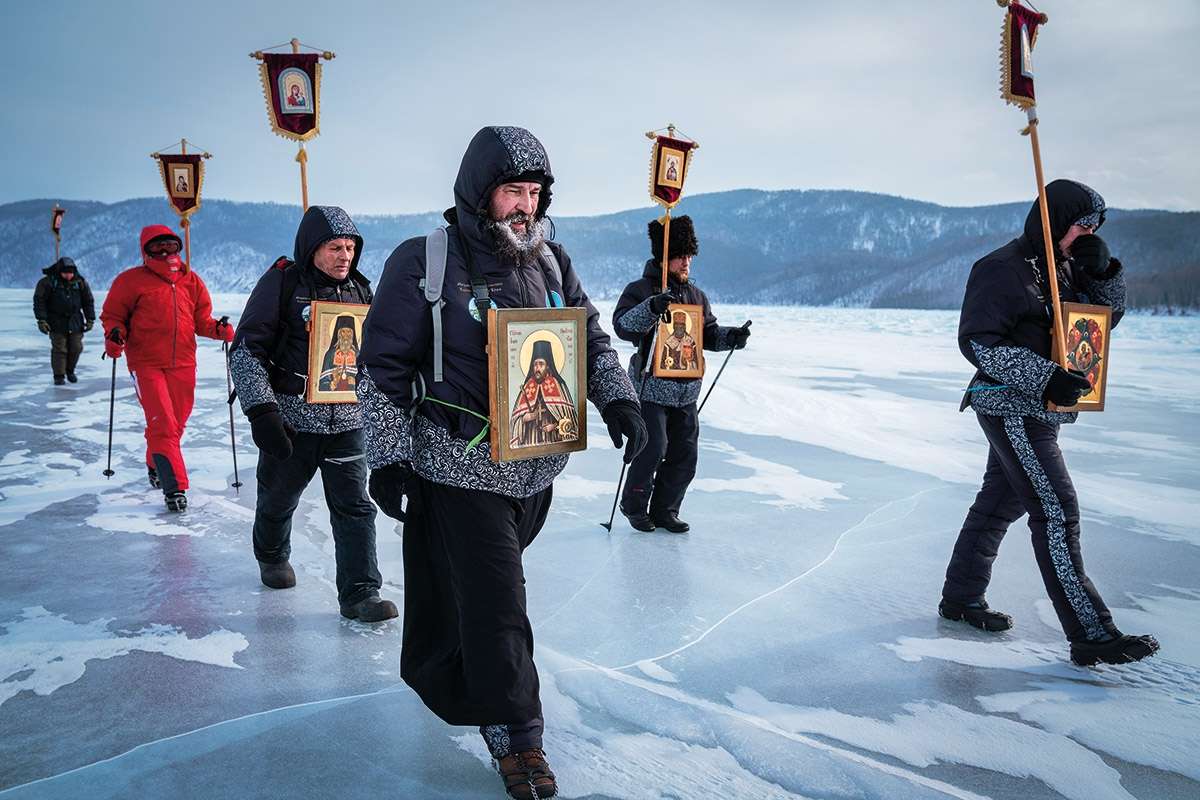
On the outskirts of Lake Baikal in southern Siberia, the world’s deepest lake, life is evolving. But change comes slowly to Russia’s frozen outpost, nearer to Beijing than Moscow
By Jens Mühling, photographs by Justin Jin
The moment the earthquake set in, the prayer stopped. The processional crosses froze in mid-air; eyes widened with fear searched the horizon. Father Yevgeny, who had icicles in his beard and an icon of Saint Innokenti on his chest, pricked up his ears.
A dark rumble echoed across the ice. It grew louder and appeared to come closer – until it subsided and eventually fell silent.
‘Harmless,’ someone said into the sudden silence.
‘Are you sure?’ asked another.
Father Yevgeny nodded. ‘God is with us.’ They resumed their walk, and again the only sounds were the crunching of crampons, and the prayer to the Virgin Mary which the believers hummed in time with their steps. The group had started out in the morning from the eastern shore. Initially they walked across snow until, leaving the bay of Barguzin behind, they reached the open lake, where the wind swept all snow aside and left nothing but crystal-clear ice through which they could gaze deep into the black-green waters below.
Their pilgrimage had started one-and-a-half years ago, when they departed from the western shore in order to circumnavigate Lake Baikal, clockwise and praying, walking for a few days every couple of weeks, in summer along the coast, in winter across the ice. By the time we joined them, Father Yevgeny and his pilgrims knew the lake’s dimensions better than most, for they had walked almost two thirds of the 2,100 kilometres that make up its shoreline.
They also knew better than most that Lake Baikal is shaken by thousands of earthquakes each year, and that most of them are harmless – but should one happen to break the ice, only God could help them.
They would walk until sunset today, and tomorrow too, and the day after, praying to the Virgin Mary without ceasing, because…
Well, why Father Yevgeny?
‘Lake Baikal,’ explained Archpriest Yevgeny Starcev, head of the Irkutsk Church of Saint Haralampos, 55 years old, five children, eight grandchildren, ‘Lake Baikal is a gift from God. We have to save it.’
Save it from what?
But at that point the priest turned his icy beard into the wind and marched on. For talking, as he had explained to us when we set out, was one thing, and praying another, and he had gone on the ice to pray. And so this winter day first had to pass before Father Yevgeny would finally explain what was wrong with this lake.

Patrolling the lake
Lake Baikal is more than 1,600 metres deep and 25 million years old, making it the planet’s deepest and oldest lake. It also holds more freshwater than any other: nearly 24,000 cubic kilometres, or about a fifth of the world’s surface freshwater. But in spite of these staggering dimensions, the lake performs the same miracle year after year: it freezes over completely.
The miracle usually starts in January and continues well into May. Both in freezing and in thawing, the lake lags behind the seasons, because its deep water layers are slow to heat up and cool down.
When you hear people around the lake say that ‘the ice is standing’, what they mean is that it is thick enough to walk on and dense enough to stretch from one shore to the other. Every time that happens, the ice transforms the lake into a very different kind of landscape. It creates roads where previously there were none. It attracts people to the lake who would otherwise not be there. Car drivers. Ice fishers. Christians. Shamans. Risk-seekers and tourists.

Although this icy world is unique, it does have a lot in common with the country that surrounds it. With its incredible dimensions, its wealth of natural treasures, its remoteness, its inaccessibility, Lake Baikal holds up a mirror to Siberia. It is similarly difficult to control, it has corners that hardly anyone knows, it is a sanctuary for communities that are no longer found elsewhere. And it is situated much closer to Beijing than to Moscow.
About 300 kilometres from the place where Father Yevgeny led his pilgrims through wind and weather, on the south-western side of the lake, a man stood on the ice. All alone, next to a small green tent, he was far from the shore, deep inside Siberia’s nothingness.
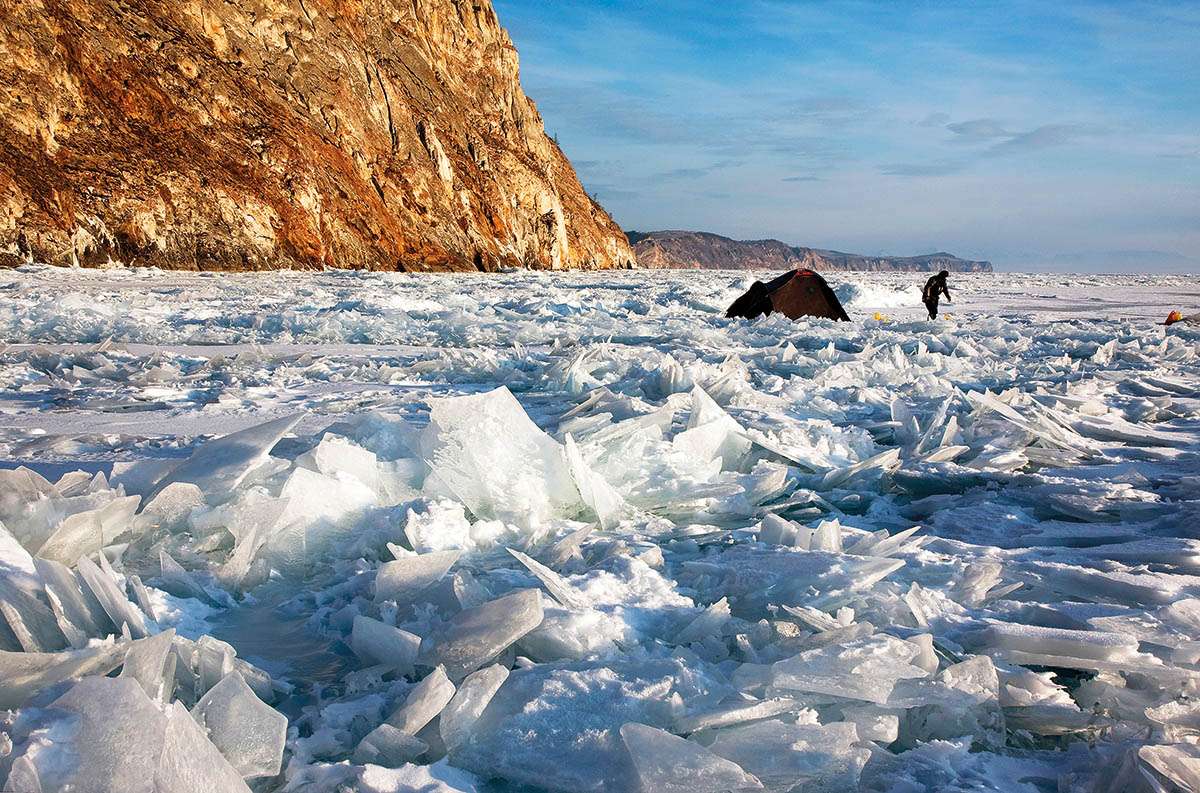
Yevgeny Apukhtin stared at him through the windshield. ‘Pinch me,’ he said to Oleg Ivanov. Seconds later, their car braked next to the tent. Yevgeny threw on his uniform jacket and got out of the car. He unscrewed his thermos flask, poured some steaming tea into the cup and handed it to the man. ‘Rescue service,’ hollered Yevgeny in halting English. ‘Where you come from?’
The man pointed south, smiling. ‘Where you go?’
He pointed north.
Yevgeny nodded blankly.
Then, suddenly, the man started talking. In unpolished but enthusiastic English he told Yevgeny that he was from China and that he wanted to walk the length of the lake, from south to north and back again, towing his luggage behind him on a sled. It would take about six weeks, he said.
The Chinese man pointed his gloved fingers at his face. ‘Siberian people are cold here,’ he said. Then he pounded his breast. ‘But warm here.’ And he went on to tell a story. Once, he said, he had got stranded at an airport, with no ticket, no money and no passport. It might have ended badly if it hadn’t been for a Siberian who had suddenly turned up and did everything to help him. And that’s why he was here now. To find out why Siberia made people’s hearts so warm, and where would you find that out if not on Lake Baikal?
‘Freak,’ said Yevgeny as he climbed back into the car. ‘Something about this lake attracts such people.’
Yevgeny and Oleg, both in their mid 40s, were sturdy, unfussy Siberians who worked for the Ministry for States of Emergency. The Russian rescue service operates a special unit for Lake Baikal in the coastal town of Listvyanka, with 300 employees and six branches.
Their car, a six-wheeled amphibious vehicle, would not have seemed out of place on the moon. The landscape beyond the windows looked just as unearthly. Hairpin cracks lined the ice, like frozen spider webs stretching all the way to the horizon. Elsewhere, the lake had entrapped millions of tiny bubbles filled with methane gas, which had frozen while rising to the surface. In other places, huge fragments of ice rose up, pushed against each other by wind and currents and piled into bizarre, translucent sculptures. When the sun touched them, they glowed with an unreal, turquoise light.

Yevgeny held a dented plastic bottle between his knees. Homemade vodka, half empty. They had poured the first glass onto the ice shortly after their departure, a few splashes to all four points of the compass. If you wanted to cross Lake Baikal, Yevgeny explained, you first had to pacify it with liquor and a few shamanic incantations, voiced in the Buryat language. Yevgeny was neither a shaman nor did he belong to the Buryats, the region’s indigenous people. ‘I’m not superstitious,’ he said, ‘but when people practise such rites for centuries, they rub off on the landscape and you better stick to them.’
Shortly after Listvyanka, the mountainous shore turned increasingly impassable and deserted. Rocks plunged steeply into the lake, with only a few isolated villages between them, most of them not serviced by any roads. Their inhabitants could only reach the outside world across the water or the ice, and whenever Baikal was in the process of thawing or freezing, they were stuck. This was one reason why the Rescue Service had such a strong presence around the lake. Sometimes people with broken bones or heart attacks or ruptured membranes had to be evacuated from the isolated villages. When we asked what the villagers lived on in these secluded places, Yevgeny shrugged. ‘They poach,’ he said.

Where human settlement turns sparse in Russia, there is often a gap between people’s lives and the state’s laws. Hardly anywhere is that gap as visible as around Lake Baikal. Take driving on the ice: you can only do this legally on one single, policed route – but wherever we looked, there were tyre traces crisscrossing the snow. Or the fishing of omul, a species of salmon only found in Lake Baikal: recently prohibited due to a dangerous shortage. Yet omul was on the menus of all the lakeside restaurants. It was the same for the hunting of nerpas, one of the planet’s very few species of freshwater seal: the practice is controlled by strict quotas, but the market vendors on the shore had glasses full of white seal fat on offer. Asked where it came from, they mumbled something about fishing nets in which the seals sometimes became entangled.
One of the people whose job it was to prevent the poaching was sleeping so soundly at one o’clock in the afternoon that Oleg and Yevgeny failed to shake him awake. It was the forester. Snoring, he lay in his tiny hut on the lake’s shore. ‘Wake up!’ yelled Yevgeny. The forester smacked his lips while dreaming. Faded icons were hanging above his bunk and the air smelled of liquor.
‘Let’s just give it up,’ sighed Oleg. On their way back to the car, the two of them said that for a few years now, the forester had not been the man he used to be. Because of the accident. His two sons had drowned.
Back then it had been Oleg and Yevgeny’s task to recover the bodies. This was neither the first nor the last time that they had, or would, drag casualties out of the lake. It was their job to dive under the ice using scuba equipment when motorists crashed through the frozen surface. The Rescue Service registers an average of 15 such accidents every year, of which around ten have resulted in fatalities in the past few winters. Only about half of the sunken cars can be recovered; the rest are too deep in the water. Submarines with remote-controlled arms are able to at least cut the bodies out of the vehicles up to a depth of 300 metres. Beyond that is a silent graveyard.
Even in shallow waters, recoveries are hard, said Oleg. ‘You dive down to the corpse and see crabs crawling out of every orifice. When you pull the body out of the water, you realize it is way too light, because the crabs have eaten it from the inside. We try to somehow hide the traces before handing the dead to their relatives.’
On the frozen lake it is all to easy to forget that the ground beneath your feet is not unconditionally firm, although the ice keeps reminding you of its unstable nature. It crackles. It creaks. Sometimes you hear sudden bangs, loud and piercing like rifle shots.
About midway through the journey, in the village of Bolshoye Goloustnoye, Yevgeny and Oleg spent the night on a colleague’s motor boat, which lay frozen in the village bay. Their colleague dropped by in the evening with a bottle of homemade vodka. Condensation trickled down the portholes of the overheated cabin as the Ministry for States of Emergency drank itself into a state of emergency.
It was late at night when Yevgeny showed the others a video on his phone. He had shot it in a forest. It showed a 14-year-old girl firing a Kalashnikov assault rifle. ‘My daughter,’ said Yevgeny. ‘She’ll be a better shot than me soon.’
Oleg grinned. ‘What does a woman have to shoot for?’
‘When the enemy comes, everyone has to shoot.’
‘What enemy?’
‘Man, don’t you see what’s happening? The Chinese are taking back the lake. They think this is all Russian-occupied territory.’
‘Nonsense, the Chinese do not wage wars. They are smarter than us, they will simply buy the lake from us.’
‘They are already at it. They chop down half the Taiga because we idiots sell the wood to them.’
‘Did you hear about that factory in Kultuk? They are planning to draw water from the lake and export it to China.’
‘Everyone is doing business with the Chinese. And when it damages the Baikal, they just blame the poachers.’
‘The poachers have no choice. They have to eat something. Who will give jobs to them around here?’
When the conversation had faded and the light in the cabin turned off, the rifle shots from the video could be heard once more from the direction of Yevgeny’s bunk. ‘When the Chinese see this,’ he mumbled, half asleep, ‘they will keep their fingers off the Baikal.’
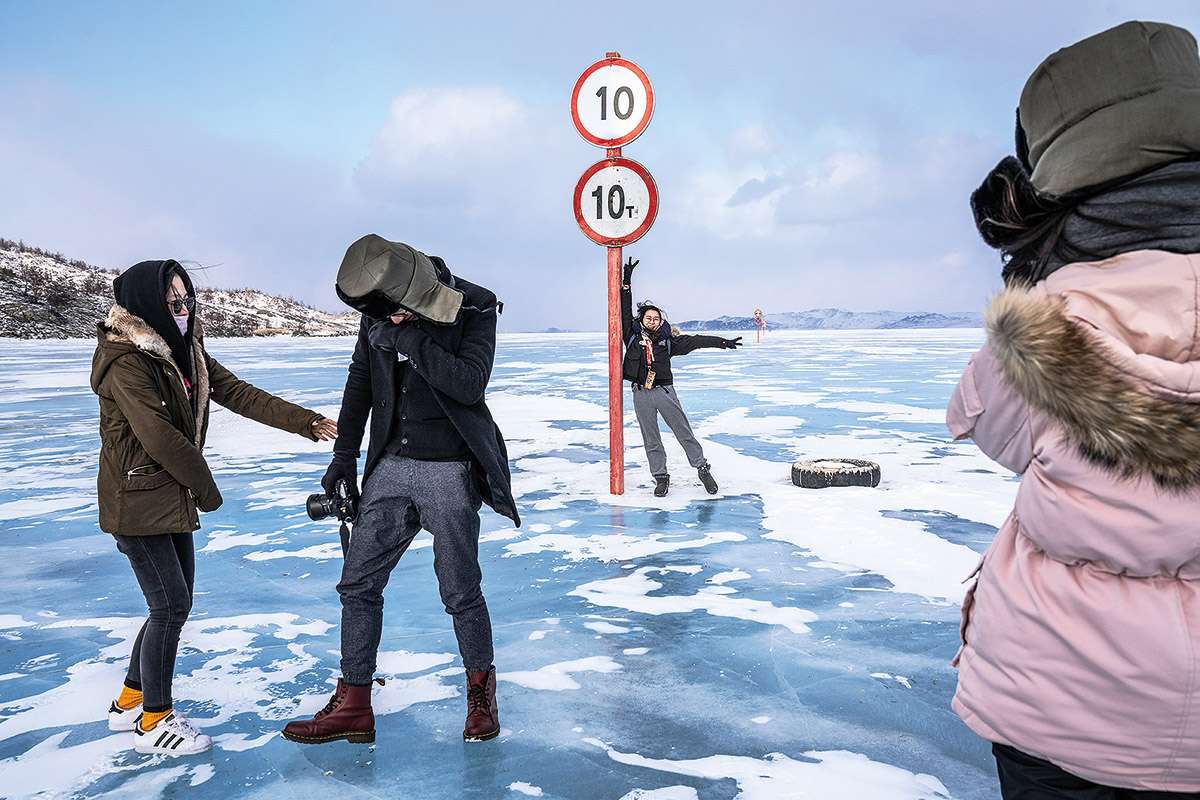
Russia and China
It was Russian cossacks who annexed the lake to the rapidly expanding Tsarist empire in the 17th century. At that time, Moscow’s emissaries negotiated a border treaty with China, which had controlled the area until the Russians’ arrival. The dividing line upon which the two powers agreed essentially still separates them today.
When you ask Chinese tourists, who have visited Lake Baikal in increasing numbers over the past few years, hardly any of them are aware of the lake’s political history. When you talk to Russians, on the other hand, almost all of them are convinced that the Chinese are coming because they believe the lake to be theirs.
The Chinese say that the exchange rate is favourable, that the landscape is beautiful and that Baikal is only three hours’ flight away from Beijing. Some cite a song that made the lake popular in China, a love ballad by singer Li Jian: ‘The day will come / When you suddenly stand before me / As clear and yet as mysterious / As Lake Baikal.’
The Russians claim to have heard how Chinese tour guides tell their groups that the lake is actually part of China. They say that the Chinese push the locals out of the tourism business, that they build their own hotels and don’t hire anyone who is not Chinese. Some cite a Russian internet petition that calls for a ban on land sales to Chinese, which by late 2017 had been signed by more than 100,000 people. ‘Panic is spreading among the people,’ it read. ‘We have to think about the future if we do not want to be conquered!’
But the numbers tell a different story. Most of the nearly 1.6 million tourists who visited the Baikal region in 2017 were Russians. Only about 210,000 arrived from abroad and about two thirds of those were Chinese.
‘For the Chinese, Lake Baikal is a tiny, exotic niche destination,’ said Ling Lu, a Shanghai resident in her mid-20s who was visiting Olkhon Island with friends. ‘There aren’t really that many Chinese here. It just feels that way to the Siberians, because there are so few of them.
Hell’s work
They call it ‘hell’s work,’ and when you watch them, you quickly understand what that means. Early in the morning, 12 men jumped down from the back of a horse-drawn cart. The sun was just rising over the frozen Selenga, the Baikal’s largest tributary, which spreads into a multi-armed delta before flowing into the lake at its eastern shore. The workers, Buryat fishermen from the nearby village of Ranzhurovo, unharnessed their horses, threw their equipment onto the ice and started the job which their fathers and forefathers, too, had called ‘hell’s work’.
First they chopped holes in the ice, each about 20 metres from the next, until a large ring of holes perforated the river’s frozen surface. Then they pushed long wooden slats into the water, using them to draw ropes from hole to hole and pull their net under the ice. The net was half a kilometre long and in the end it hung in the water like a ring-shaped curtain, reaching from the river’s icy surface down to its bottom, about one-and-a-half metres below. They pulled the net’s two ends back out of the water through one of the holes. In doing so, they turned the underwater curtain into a bag, pulling it tighter and tighter until they finally hauled it ashore, filled with grayling, roach, and perch.

It takes enormous strength to move the net under the ice – more strength than any human could afford. That’s where the horses come in. Three sturdy ponies, their hoofs steadied by ice crampons, trudged in circles around wooden winches. Creaking, the machines rotated, slowly winding up the net.
Everything about this craft looked as if it belonged to a different century: the winches, the horses, the ice hoes, the weathered faces. But the fishermen of Ranzhurovo had their reasons for sticking to the old ways. ‘The horses notice when the net gets caught under the ice’, explained Nikolay Pinoyev, the old village mayor. ‘When that happens, they will stop and wait until we undo the knot. A motor doesn’t notice anything, it will keep running and tear up the net.’
What we witnessed here came as a surprise. We had been told that net fishing under the ice was as good as extinct. Oleg and Yevgeny, the two rescue workers, had said that horse fishing was only to be found in historical paintings. And yet here, in the depths of the Selenga Delta, both traditions were still part of everyday life. The lake was so large that people at one end did not know how people lived at the other.
Ranzhurovo had something else that many had described to us as a thing of the past: a shaman. Not a folk magician like the ones who performed for tourists on Olkhon Island, but a practising village shaman, one who spent his mornings healing the sick and his afternoons – at least that particular afternoon – soothing forest spirits.
Karl Pomishin, who was in his early 50s and owed his first name to Marx, lit a piece of fir bark in the crew’s quarters of the local sawmill. He blew the smoke into every corner, mumbling Buryat incantations. The pin-up calendar of a German chainsaw manufacturer was hanging on a wall behind his back. Miss February posed with a branch cutter.
After the ritual, the sawmill’s crew drove into the forest, where the six workers knelt down in front of a pine tree. Sawdust trickled from their work jackets into the snow as they bowed their heads in prayer. The shaman sprinkled liquor on the tree bark. ‘You spirits of the forest,’ he mumbled, ‘forgive these men for cutting trees, protect them from accidents and spare their tools from rust, let the forests grow and the wood prices soar.’
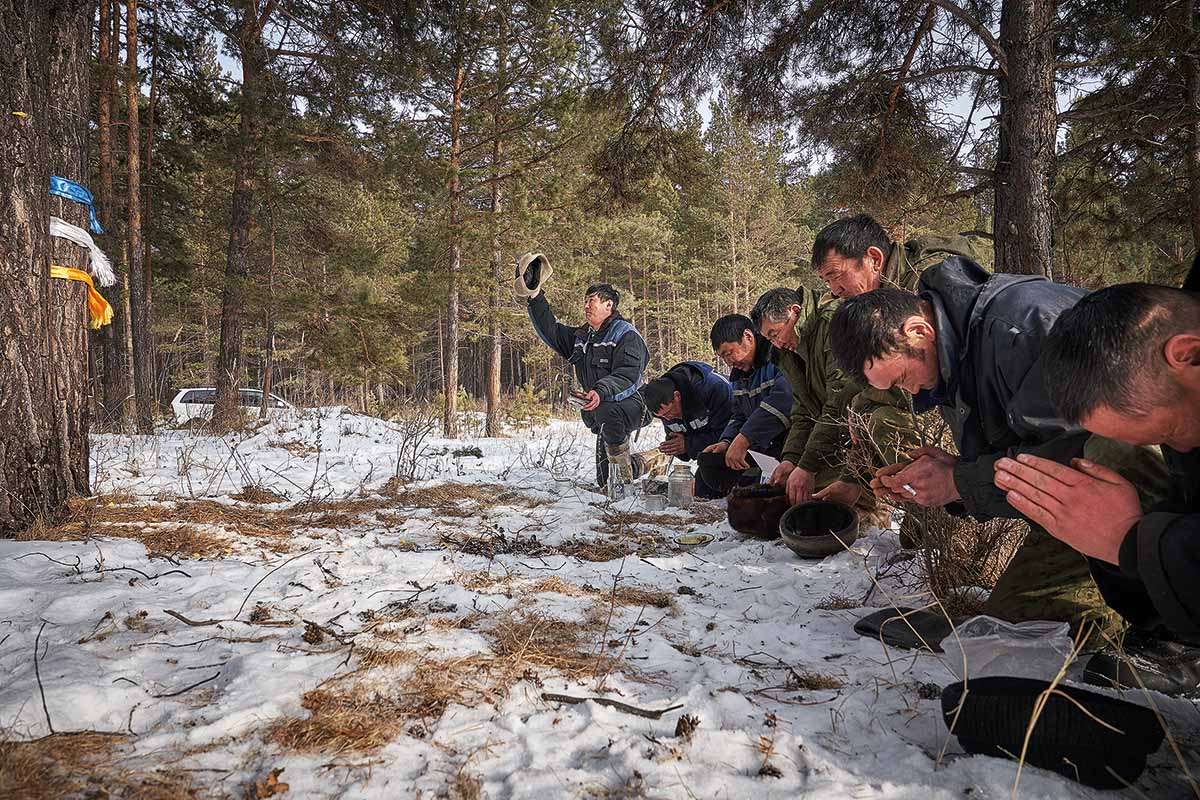
Ranzhurovo has about 500 inhabitants, all of them Buryats. For generations, the village survived on fishing, rare among the indigenous people of the region, whose ancestors were mostly cattle-herding nomads. Their village used to lie directly at the mouth of the river, until in the 1950s the only outflow of Lake Baikal, the Angara River, was dammed to supply the industrial city of Irkutsk with energy. As a consequence, the lake’s water level rose by about one metre, pushing the water deep into the Selenga Delta, where it flooded the old village of Ranzhurovo. The Soviet authorities built new houses for the inhabitants a few kilometres upstream.
Nikolay Pinoyev, the village mayor, told this story at the wheel of his Lada Niva. Next to him was Pomishin, the shaman. Together with a bus full of villagers they were on their way to the town of Selenginsk, where the Buryat New Year was to be celebrated that evening.
A few hundred people were gathered in the banquet hall, most of them in colourful national costumes. Among them were a few former inhabitants of Ranzhurovo who now worked in the region’s capital city, Ulan-Ude, and used their village houses only as holiday homes. A woman had brought her son with her, a skinny young man in a dark suit who routinely distributed his business cards. ‘Aldar Fyodorov’, they read, ‘Real Estate Agent’. It was difficult to imagine this man among the wooden houses of Ranzhurovo. The fishermen shook his hand hesitantly, as if afraid to crush something expensive.

Dance groups and choirs performed, followed by local dignitaries. The speakers said that it had been a good year, an excellent one in fact, and that the next one would be even better. Only one of them briefly mentioned ‘that little problem with the fish’, for which a solution would certainly be found. Pinoyev, the village mayor, applauded with a stoic smile. That little problem with the fish was a huge problem for Ranzhurovo. The ban on fishing omul had come into force a few months ago. It hadn’t affected the villagers for the time being, because in the winter they caught other fish in the frozen river delta. But in the summer, when they ventured out into the lake with their boats, they had always fished omul, just like their fathers and forefathers.
The village had survived many changes, but how would it remain a fishing village if fishing was no longer allowed? On the southern, more densely populated shore of the lake, most people were already giving up fishing. It was easier to rent out rooms to the tourists.
At the other end of the banquet table, the shaman sat nodding patiently as the young property agent talked to him. ‘Real estate’, he said. ‘Real estate is Buryatia’s future.’
The final sermon
On the frozen lake, one of the pilgrims told a story. Once upon a time, he said, a scientist visited Lake Baikal in order to prove that water has a sense of memory. He poured lake water into four glasses. Then he exposed the first glass to heavy metal music, the second one to Russian swearwords, the third one to Tchaikovsky, and the fourth one to Orthodox Christian prayers. Finally he put all four glasses in a freezer. When he later examined the frozen water under a microscope, the heavy metal ice crystals looked sharp-edged and rugged. Even uglier were the crystals that had been exposed to swearwords. The Tchaikovsky crystals, on the other hand, were much more harmonious. But the most beautiful ones were the crystals that had been prayed to.
‘And that is why we pray on the ice,’ the narrator concluded. ‘To heal the Baikal.’
The participants of Father Yevgeny’s procession were in the middle of their lunch break. A camping stove stood beside a self-chopped hole in the ice. With fingers turned stiff by the cold, the believers spooned instant noodles boiled up with Baikal water.
Erast Butakov, a Russian adventurer who a few years previously had circumnavigated the lake on his own and was now repeating the hike with his son, told the next story. As a student, he said, he and his friends had often lured girls onto the frozen lake. Every time they did this, they would chop a shallow hole in the ice, place some olives into it, pour martini on top and dole out straws.
‘Then,’ said Butakov, ‘when the girls were down on their bellies and drinking, we would take pictures of their asses. And that’s why this lake is sacred to me to this day.’
Father Yevgeny chewed his noodles in silence as these stories circulated. When the setting sun coloured the ice purple, the procession reached the coastal village of Maksimikha. A camp was prepared for the night in the local church. The parish women kissed Father Yevgeny’s hands in greeting. ‘Father’, they cried, ‘You are well! God be praised!’
It was past ten o’clock when Father Yevgeny wiped the crumbs of the evening meal from his beard. ‘There will be war with the Chinese,’ the priest said finally. ‘That is inevitable.’

At this moment, Erast Butakov, the adventurer, quietly left the room, because he knew what was coming and as he would tell us later, he could no longer bear to hear it. But everyone else drank in the priest’s words.
‘The Chinese,’ Father Yevgeny continued, ‘do not know what is good and what is evil, because they have no God. They do not believe in the Creator, so why would they respect His creation?’
A painful sermon unfolded. Russia, said Father Yevgeny, was under threat from all sides. In the east, the Chinese lurked. In the west, it was the Americans. Between them, there were the Europeans, who destroyed themselves with their false tolerance and their freedom. And Russia was alone, all alone with its vast borders, which half the world was trying to get its fingers on.
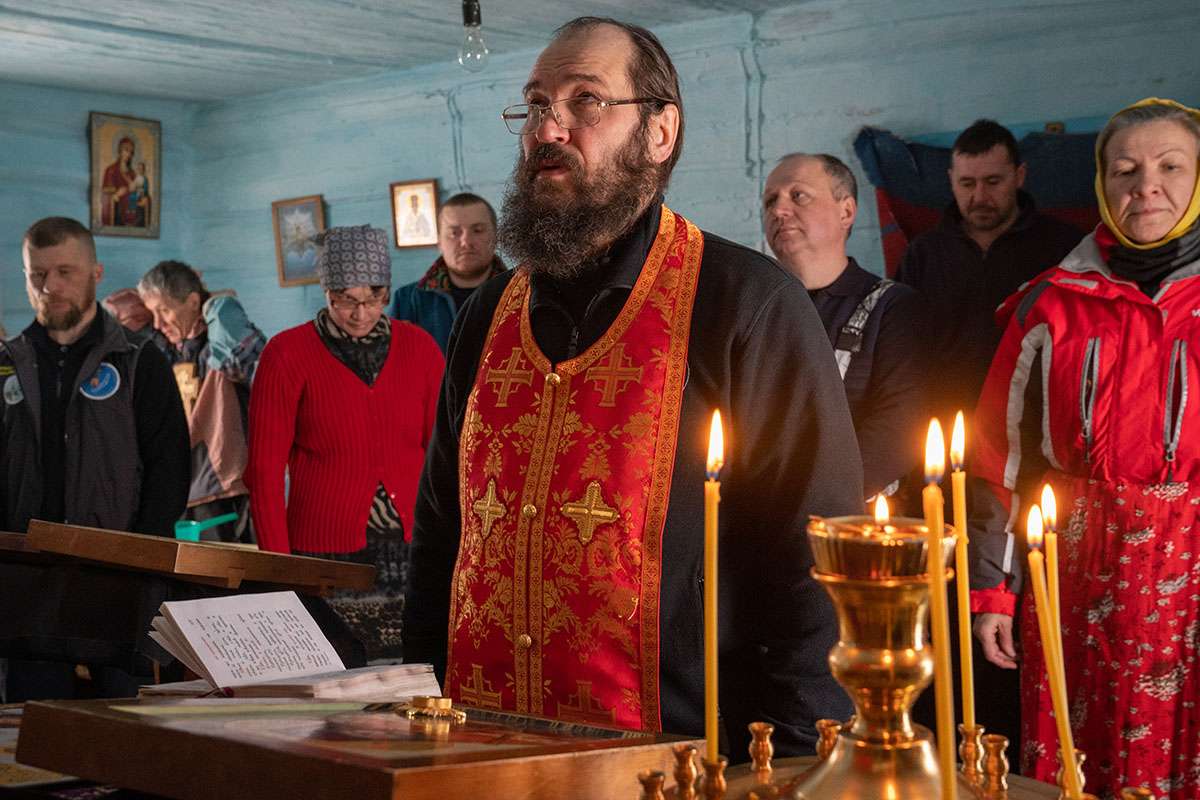
Father Yevgeny pointed to the icon that he had put up on the stove for the night. Saint Innokenti, he said, had been the one to convert the peoples of Siberia in the 19th century. He had also carried the Russian faith all the way to Alaska and if it hadn’t been for a weak Tsar who had sold the region to the Americans, Alaska could have been Russian and Orthodox to this day. And that is why they had to pray, Father Yevgeny concluded – so that the Baikal would not suffer the same fate. His listeners’ eyes shone with approval. None of them voiced a word of objection.
After the night prayer, the believers sank into sleep. Polyphonic snoring filled the parish hall. Outside, Lake Baikal was silent in the moonlight, the ice dull now, like a mirror gone blind.
Only one man’s eyes were wide open. Up on the stove, Saint Innokenti kept watch over the sleeping pilgrims. Tomorrow, Father Yevgeny would carry the icon across the frozen lake again, so that no thaw would ever melt Russia.




